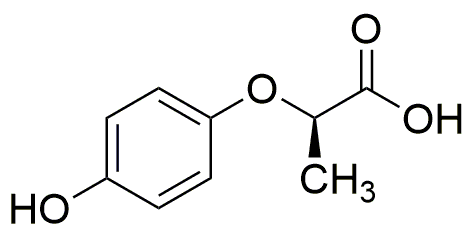(R)-(+)-2-(4-Hydroxyphenoxy)propionic acid is widely utilized in research focused on
- Pharmaceutical Development: This compound serves as a key intermediate in the synthesis of anti-inflammatory drugs, providing effective pain relief with fewer side effects compared to traditional NSAIDs.
- Agricultural Applications: It is used in the formulation of herbicides, helping to control unwanted plant growth while being less harmful to the environment, thus appealing to eco-conscious farmers.
- Cosmetic Industry: The compound is incorporated into skincare products for its antioxidant properties, promoting skin health and reducing signs of aging, making it a popular choice among cosmetic formulators.
- Research in Biochemistry: It is utilized in various biochemical assays to study enzyme activity and metabolic pathways, aiding researchers in understanding complex biological processes.
- Food Industry: This compound can act as a preservative, extending the shelf life of food products by inhibiting microbial growth, which is beneficial for manufacturers looking to improve product longevity.
Informations générales
Propriétés
Sécurité et réglementation
Applications
(R)-(+)-2-(4-Hydroxyphenoxy)propionic acid is widely utilized in research focused on
- Pharmaceutical Development: This compound serves as a key intermediate in the synthesis of anti-inflammatory drugs, providing effective pain relief with fewer side effects compared to traditional NSAIDs.
- Agricultural Applications: It is used in the formulation of herbicides, helping to control unwanted plant growth while being less harmful to the environment, thus appealing to eco-conscious farmers.
- Cosmetic Industry: The compound is incorporated into skincare products for its antioxidant properties, promoting skin health and reducing signs of aging, making it a popular choice among cosmetic formulators.
- Research in Biochemistry: It is utilized in various biochemical assays to study enzyme activity and metabolic pathways, aiding researchers in understanding complex biological processes.
- Food Industry: This compound can act as a preservative, extending the shelf life of food products by inhibiting microbial growth, which is beneficial for manufacturers looking to improve product longevity.
Documents
Fiches de données de sécurité (FDS)
La FDS fournit des informations de sécurité complètes sur la manipulation, le stockage et l’élimination du produit.
Spécifications du produit (PS)
Le PS fournit une description complète des propriétés du produit, notamment sa composition chimique, son état physique, sa pureté et les exigences de stockage. Il détaille également les plages de qualité acceptables et les applications prévues du produit.
Certificats d'analyse (COA)
Recherchez des certificats d'analyse (COA) en saisissant le numéro de lot du produit. Les numéros de lot et de lot se trouvent sur l'étiquette d'un produit, après les mots « Lot » ou « Lot de fabrication ».
Numéro de catalogue
Numéro de lot/série
Certificats d'origine (COO)
Ce certificat d'exploitation confirme le pays dans lequel le produit a été fabriqué, et détaille également les matériaux et composants utilisés et s'il est issu de sources naturelles, synthétiques ou autres sources spécifiques. Ce certificat peut être requis pour les douanes, le commerce et la conformité réglementaire.
Numéro de catalogue
Numéro de lot/série
Fiches de données de sécurité (FDS)
La FDS fournit des informations de sécurité complètes sur la manipulation, le stockage et l’élimination du produit.
DownloadSpécifications du produit (PS)
Le PS fournit une description complète des propriétés du produit, notamment sa composition chimique, son état physique, sa pureté et les exigences de stockage. Il détaille également les plages de qualité acceptables et les applications prévues du produit.
DownloadCertificats d'analyse (COA)
Recherchez des certificats d'analyse (COA) en saisissant le numéro de lot du produit. Les numéros de lot et de lot se trouvent sur l'étiquette d'un produit, après les mots « Lot » ou « Lot de fabrication ».
Numéro de catalogue
Numéro de lot/série
Certificats d'origine (COO)
Ce certificat d'exploitation confirme le pays dans lequel le produit a été fabriqué, et détaille également les matériaux et composants utilisés et s'il est issu de sources naturelles, synthétiques ou autres sources spécifiques. Ce certificat peut être requis pour les douanes, le commerce et la conformité réglementaire.


